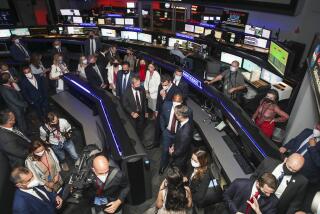Space Station Will Provide Spinoffs, NASA Chief Says
IRVINE â Building a $30-billion space station could lead to the development of several key technologies, NASAâs new interim director said Friday.
Aaron Cohen, who was appointed to the space agency post last week, said the launching of the controversial Space Station Freedom later this decade could generate new industries in biotechnology, semiconductor manufacturing and nuclear energy.
âEach of the technology applications has the potential in the years ahead to exert a profound effect on our society and on American competitiveness in the marketplace,â Cohen told an audience at a National Academy of Engineering conference in Irvine on Friday.
But critics of the program in Congress and elsewhere have said that the station is too costly and cannot be supported from a scientific standpoint.
Cohen, formerly director of the Johnson Space Center in Houston, was named to his current post after NASA chief Richard H. Truly resigned in a dispute with the Bush Administration last month.
The space station has been under development since 1984. One of the largest prime contractors is McDonnell Douglas Space Systems Co. in Huntington Beach.
Congress approved $2.25 billion in funding for the program in 1993. The first elements of the station are to be launched into space in November, 1995.
Cohen--making a case for the orbiting manned station--said it could serve as a laboratory for growing organic tissue in so-called âbioreactors,â which scientists believe could lead to new treatments for diseases and burn victims.
He also said that the contaminant-free vacuum of space would make an ideal setting for a semiconductor manufacturing chamber that could produce defect-free microchips.
Cohen also voiced support for construction of a heavy-lift rocket capable of carrying several hundred thousand pounds into space. The biggest rocket today, General Dynamicsâ Titan IV, can haul payloads of only 39,000 pounds.
More to Read
Sign up for Essential California
The most important California stories and recommendations in your inbox every morning.
You may occasionally receive promotional content from the Los Angeles Times.










